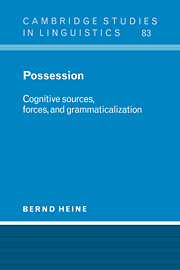3 - On attributive possession
Published online by Cambridge University Press: 27 October 2009
Summary
Predicative possession belongs to the most complex phenomena in the grammar of many languages; we therefore decided to make it the main topic of this book. Compared to it, attributive possession (or nominal, or phrasal possession) appears to present a relatively simple structure: it consists essentially of two noun phrases linked to one another in a specific way. Accordingly, work on attributive possession has focussed mostly on the way the two noun phrases are linked, e.g. whether the possessee (=the head) precedes or follows the possessor (=the dependent, or genitive, or modifier), or whether the link is marked on the possessee (=head-marking), on the possessor (=dependent-marking), on both, or on neither (cf. Ultan 1978; Nichols 1988; 1992).
A detailed treatment of attributive possession would be beyond the scope of this work; nevertheless, in the paragraphs to follow we shall try to relate the findings made in the course of the preceding chapter to the structure of attributive possession, that is, we will attempt to determine how constructions of the type Peter has a new car differ from constructions having the form Peter's new car. The issue is a popular one, and it is an old one; quite a number of studies have been devoted to it in the course of recent decades.
Predicative and attributive possession resemble one another in a number of ways; some of the similarities were pointed out in Chapter 1 (section 1.2.3).
Information
- Type
- Chapter
- Information
- PossessionCognitive Sources, Forces, and Grammaticalization, pp. 143 - 186Publisher: Cambridge University PressPrint publication year: 1997
